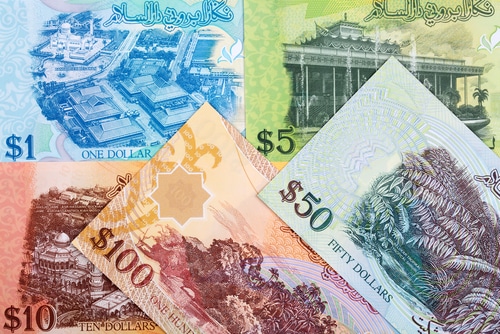The Brunei Dollar, commonly abbreviated as BND, is a fascinating currency with a rich history and unique financial arrangements that make it stand apart from many other currencies in the world. Whether you’re a traveler, an expat, or someone interested in global currencies, understanding the Brunei Dollar can help you better appreciate its significance in Southeast Asia and beyond.
This guide will provide a comprehensive overview of the Brunei Dollar, its history, exchange arrangements, where and how it’s used, and practical tips for using or exchanging it.
What is the Brunei Dollar (BND)?
The Brunei Dollar (BND) serves as the national currency of Brunei, a small but wealthy nation located on the island of Borneo in Southeast Asia. It has been the official currency since 1967, replacing the Malaya and British Borneo dollar. Interestingly, it shares a 1:1 exchange rate agreement with the Singapore Dollar (SGD), meaning both currencies are interchangeable within Brunei and Singapore.
The Brunei Dollar is issued by the Autoriti Monetari Brunei Darussalam (AMBD), Brunei’s central bank, which oversees its stability and regulation. It is symbolized as BND or represented with the dollar sign ($).
Quick Facts About the Brunei Dollar:
- ISO Code: BND (ISO 4217)
- Subunit: Each Brunei Dollar is divided into 100 “cents.”
- Coins: 1 cent, 5 cents, 10 cents, 20 cents, 50 cents.
- Banknotes: $1, $5, $10, $50, $100, $500, $1,000, and $10,000 (yes, $10,000 banknotes exist).
A Unique Peg to the Singapore Dollar
One of the most notable aspects of the Brunei Dollar is its currency interchangeability agreement with the Singapore Dollar. This arrangement, established in 1967, allows individuals to use Brunei Dollars in Singapore and vice versa. The 1:1 fixed exchange rate is maintained under a Currency Interchangeability Agreement between the two countries. This close economic relationship has bolstered trust and financial stability for both currencies.
The History of the Brunei Dollar
The story of the Brunei Dollar begins in the colonial era. Before 1967, Brunei used the Malaya and British Borneo Dollar, which was issued jointly by Brunei, Malaya (modern Malaysia), Sarawak, and North Borneo. When Brunei gained independence in currency management in 1967, it introduced its own version of the dollar, maintaining the same value as the previous currency.
Initially printed in paper form, Brunei gradually introduced polymer banknotes in the mid-2000s. These polymer notes are more durable and incorporate advanced security features, making them less susceptible to counterfeiting.
Why is the Brunei Dollar Important?
Although Brunei is a small country with a population of less than 500,000, the Brunei Dollar plays an outsized role in the economy. Here are a few reasons why it’s an important currency:
- Economic Stability
Brunei is heavily reliant on oil and gas exports. Thanks to its abundant natural resources and prudent financial management, the Brunei Dollar remains stable, reflecting the country’s strong economy.
- Interchangeability with SGD
The 1:1 peg with the Singapore Dollar gives the Brunei Dollar strong international credibility and convenience for trade and travel between the two nations.
- Tourist and Business Use
Singapore visitors traveling to Brunei don’t need to exchange their currency, and the same applies to Brunei travelers in Singapore, simplifying commerce and travel.
Practical Tips for Using the Brunei Dollar
1. Where the Brunei Dollar is Used
- Primary Use: The Brunei Dollar is used exclusively in Brunei for all transactions.
- Accepted in Singapore: You can also use Brunei Dollars in Singapore due to the interchangeability agreement. However, this is less common, as Singaporeans typically prefer their own currency.
2. Exchanging the Brunei Dollar
- Exchange Rates: If you’re catering to currencies outside of Brunei or Singapore, ensure to check daily exchange rates to know when you’re getting the best value.
- Where to Exchange: You can exchange BND at most banks, currency exchange kiosks, and international airports in Southeast Asia. ATMs in Brunei also allow cash withdrawals in BND.
3. Digital Payments
Tourists visiting Brunei will also find the country increasingly digital in payment systems. Many retail outlets, restaurants, and hotels accept internationally recognized credit cards, like Visa and Mastercard.
4. Taxes and Tipping
There is no value-added tax (VAT) in Brunei, and tipping is not customary, though it’s appreciated in service industries.
5. Handling Larger Denominations
Be aware that higher denominations, such as the $1,000 or even $10,000 notes, may not be easily accepted by all vendors. It’s best to carry smaller denominations for everyday purchases.
The Role of the Brunei Dollar in Regional Trade
Brunei’s economic reliance on trade has made having a reliable and stable currency a key priority. While the Brunei Dollar itself is not an internationally traded reserve currency, its link with the Singapore Dollar enhances its utility for trade transactions and foreign investments.
Exports such as liquefied natural gas (LNG) and crude oil contribute significantly to Brunei’s GDP. The stability of the Brunei Dollar ensures buyers and trade partners trust transactions involving Brunei businesses.
Fun Facts About the Brunei Dollar
- Security Features: Brunei’s polymer banknotes have advanced security features, including see-through windows, raised printing, and UV light images.
- Royal Portraits: The banknotes often feature the image of Sultan Hassanal Bolkiah, Brunei’s current ruler and one of the wealthiest individuals in the world.
- $10,000 Note: Brunei is one of the few countries in the world to issue a $10,000 note, which is primarily used for interbank purposes.
Why it Matters to Understand the Brunei Dollar
Whether you’re traveling to Brunei, engaging in trade with Bruneian companies, or are simply curious about international finance, understanding the Brunei Dollar adds valuable context to its unique position. Its connection to the Singapore Dollar, rich history, and solid reputation make it a currency worth knowing about.
To make your currency exchanges easy and seamless, always use a reliable money transfer or currency exchange service that offers transparency and security.
